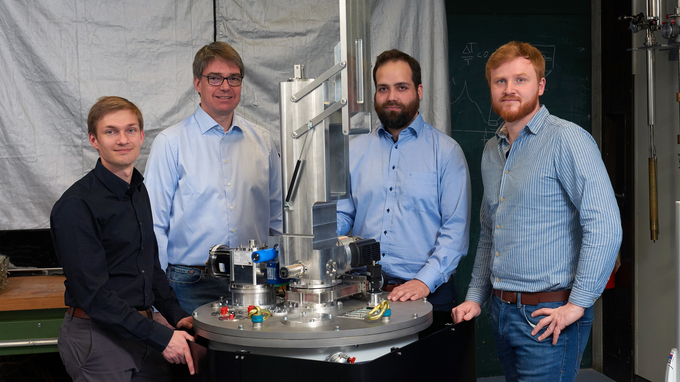Kühlung für Quantenelektronik
TUM-Ausgründung entwickelt magnetische Kühlung für extrem tiefe Temperaturen
2020-06-12 – Nachrichten aus dem Physik-Department

Für die Grundlagenforschung in der Quantenphysik sind tiefe Temperaturen ein wichtiges Werkzeug. Aber auch immer mehr Technologien, die auf quantenmechanischen Effekten beruhen, schaffen den Sprung vom Labor in die kommerzielle Anwendung.
Bekannte Beispiele sind extrem empfindliche Detektoren und Quantencomputer. Doch für den Betrieb der sensiblen Quantentechnologien werden in der Regel sehr tiefe Temperaturen benötigt, nahe am absoluten Nullpunkt bei etwa -273 °C. Daher steigt die Nachfrage nach effektiven Kühlungslösungen derzeit rasant an.
Diesen Bedarf wollen die TUM-Forscher Alexander Regnat, Jan Spallek, Tomek Schulz und Prof. Christian Pfleiderer bedienen. Alle vier arbeiten derzeit am Physik-Department der TUM an ihrem Prototyp. Weitere Mitarbeiter und auch ein eigener Firmensitz seien, laut Alexander Regnat, schon in Aussicht.
Die Idee kam dem Wissenschaftlerteam bei ihrer Arbeit an der TU München. Immer wieder stießen die herkömmlichen Methoden zum Erreichen solch tiefer Temperaturen an ihre Grenzen. Deshalb entwickelte die Gruppe ihre eigene Technik, um eine dauerhafte Kühlung zu gewährleisten und gründeten im Sommer 2018 die kiutra GmbH.
Magnetische Kühlung
Um sehr tiefe Temperaturen zu erzeugen, nutzt man in der Regel flüssige Gase. Wenn dauerhaft Temperaturen nahe des absoluten Nullpunkts benötigt werden, kommt bisher das äußerst seltene und teure Isotop Helium-3 zum Einsatz. Eine Alternative dazu bieten magnetische Kühlverfahren, die solche Temperaturen mithilfe preiswerter Feststoffe erzeugen können – in der Regel aber nur für eine begrenzte Zeit.
Konzepte für eine dauerhafte magnetische Kühlung existieren zwar seit vielen Jahren. „Die technische Umsetzung ist allerdings extrem anspruchsvoll und hat so die Entwicklung eines Produkts für den breiten Einsatz bisher verhindert“, erklärt Tomek Schulz.
„Wir sind nun der weltweit erste kommerzielle Anbieter einer Kühltechnik, die magnetisch dauerhaft Temperaturen nahe des absoluten Nullpunkts bei -273°C erreicht,“ sagt Alexander Regnat. „Unser großer Vorteil: Wir brauchen dafür kein teures Helium-3, sondern lediglich Strom.“
Entrepreneurship-Förderung an der TUM
Mehr als 70 Ausgründungen gibt es an der TUM jedes Jahr. Als Ausgründung des Physik-Departments wird das Team derzeit von einem EXIST-Gründerstipendium gefördert. Das Programm unterstützt Studierende, AbsolventInnen und WissenschaftlerInnen ihre Gründungsidee zu realisieren. 2016 und 2017 erhielt kiutra außerdem eine Validierungsförderung des Freistaates Bayern.
Vor wenigen Tagen investierte ein Konsortium aus Lead-Investor High-Tech Gründerfonds (HTGF), dem Deep-Tech VC APEX Ventures sowie der UnternehmerTUM Initiative for Industrial Innovators einen siebenstelligen Betrag in das Spin-off der TU München. Das neue Kapital wird dazu dienen, den weltweiten Vertrieb und die Produktionskapazitäten für den rasant wachsenden Quantentechnologie-Markt weiter auszubauen.
- Redaktion
- Dr. Andreas Battenberg, Dr. Johannes Wiedersich